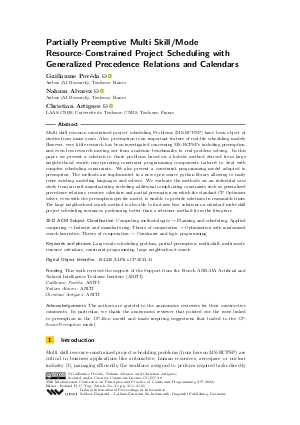@InProceedings{poveda_et_al:LIPIcs.CP.2023.31,
author = {Pov\'{e}da, Guillaume and Alvarez, Nahum and Artigues, Christian},
title = {{Partially Preemptive Multi Skill/Mode Resource-Constrained Project Scheduling with Generalized Precedence Relations and Calendars}},
booktitle = {29th International Conference on Principles and Practice of Constraint Programming (CP 2023)},
pages = {31:1--31:21},
series = {Leibniz International Proceedings in Informatics (LIPIcs)},
ISBN = {978-3-95977-300-3},
ISSN = {1868-8969},
year = {2023},
volume = {280},
editor = {Yap, Roland H. C.},
publisher = {Schloss Dagstuhl -- Leibniz-Zentrum f{\"u}r Informatik},
address = {Dagstuhl, Germany},
URL = {https://drops.dagstuhl.de/entities/document/10.4230/LIPIcs.CP.2023.31},
URN = {urn:nbn:de:0030-drops-190689},
doi = {10.4230/LIPIcs.CP.2023.31},
annote = {Keywords: Large-scale scheduling problem, partial preemption, multi-skill, multi-mode, resource calendars, constraint programming, large neighborhood search}
}

 Creative Commons Attribution 4.0 International license
Creative Commons Attribution 4.0 International license































